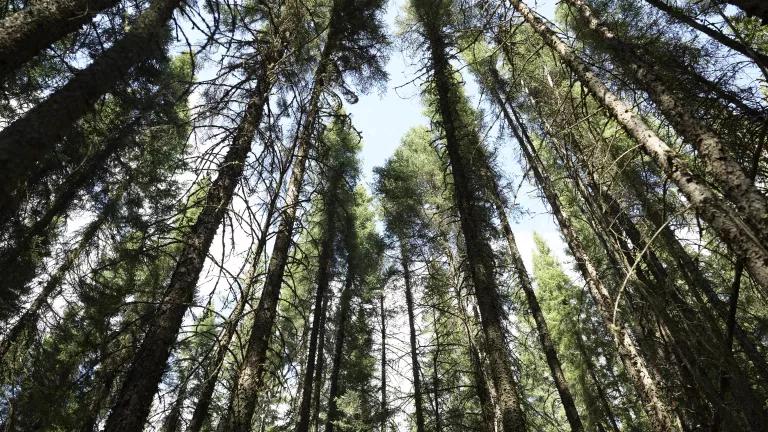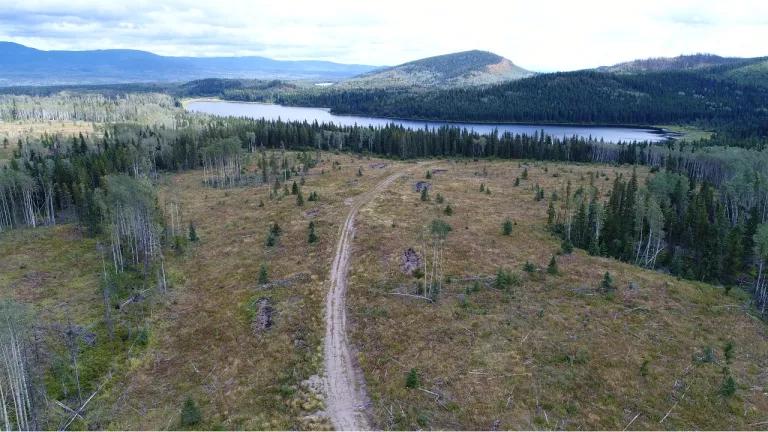Pulp Fiction: New Report Shows P&G Is Spinning Tales
In recent years, P&G has faced mounting criticism over the fact that many of its tissue products are made from virgin forests, which is contributing to the clearcutting of some of the world’s last primary forests, including in the climate-critical Canadian boreal. Rather than meaningfully addressing issues in its supply chains, P&G has doubled down on claims that it supports the sustainable management of global forests.

When Procter & Gamble heads to its annual shareholder meeting next week, the company will face a reckoning. This time last year, the company faced an “investor rebellion” when two thirds of its voting shareholders called on the company to improve the sustainability of its supply chains from forests. In recent years, P&G has faced mounting criticism over the fact that many of its tissue products are made from virgin forests, which is contributing to the clearcutting of some of the world’s last primary forests, including in the climate-critical Canadian boreal. Rather than meaningfully addressing issues in its supply chains, P&G has doubled down on claims that it supports the sustainable management of global forests. Yet these claims are built on a foundation of myths.
A new NRDC report and scorecard, Pulp Fiction: Canada's Largest Pulp Producers' Actions Do Not Match Their Sustainability Claims, takes a closer look at the logging practices obscured behind P&G’s glossy ads. P&G is the largest U.S. purchaser of boreal tissue pulp from Canada: the second-highest pulp exporter in the world. Canadian pulp ends in a range of wasteful single-use products including toilet paper and tissue. Our new scorecard assessed the policies of the seven largest pulp producers in Canada—including key suppliers to P&G—across several criteria reflecting key minimum standards for Indigenous rights, safeguarding primary forests, protecting threatened species, and committing to superior forest certification. Six of the seven companies (Paper Excellence/ Domtar, Canfor, West Fraser, Mercer International, Resolute Forest Products, and Aditya Birla Group) failed almost all of these criteria, with grave implications for Canada’s primary forests. One outlier, Alberta-Pacific Forest Industries (Al-Pac), performed much better than its peers, but is the smallest of the pulp producers by volume and does not reflect the industry at large. By failing to set clearer expectations of its suppliers, P&G is complicit in disregarding the rights of Indigenous Peoples, clearing habitat of threatened species, and destroying primary forests.
Large areas of primary forest are critical carbon stores in the fight against catastrophic climate change, and contain habitat to many at-risk species including boreal caribou and southern mountain caribou. Efforts to protect Canada’s primary forests reached a fever pitch in 2021, when protests against old-growth logging in British Columbia became the largest act of civil disobedience in Canadian history. Yet none of the pulp suppliers assessed in our report ensure that the logged wood supplying their mills avoids primary forests, or meets minimum caribou habitat requirements advocated by Canada's own federal government. By relying on this pulp, P&G continues to make toilet paper using trees from primary forests and caribou habitat. It’s hard to imagine a sadder fate for some of the world’s last unlogged forests than a roll of Charmin toilet paper.
The report also assessed whether the companies required free, prior and informed consent from Indigenous Peoples whose traditional territories are potentially impacted by logging operations supplying the companies’ mills. The United Nations Declaration on the Right of Indigenous Peoples, supported by more than 140 countries including Canada, indicates that Indigenous Peoples’ consent should be given before industrial operations that could impact them and their traditional territories. Yet not one company has this requirement (although Al-Pac has made important progress in the areas it manages). This is a marked contrast from P&G’s public materials, which make vague references to protecting Indigenous rights. Evidently, the company has not made that a requirement of its pulp suppliers.
Most of the pulp suppliers also failed to rely meaningfully on strong forest certification. Indigenous rights and environmental experts across Canada agree that the Forest Stewardship Council (FSC) is the strongest forest certification system in the country, with far superior standards to its competitors like the Sustainable Forestry Initiative (SFI). Yet most of the pulp suppliers we assessed rely predominantly on far weaker certification standards for the wood supplying their mills and for the lands they manage.
While FSC is Canada’s best certification regime, it is still inherently unsustainable for a company to make toilet paper out of some of the world’s last primary forests. It may be telling that P&G’s only substantive commitment in recent years has been to increase their FSC supply, while refusing to make any commitments to reducing their forest dependence. P&G should require its wood-based materials to come from FSC-certified forests, with robust protections for primary forest areas and caribou habitat, but this alone would not make their tissue products sustainable. The company inventing Bluetooth-enabled Charmin dispensers can surely develop methods of making toilet paper without primary forests: especially considering other companies are already doing this.
Despite a year to take action since last year’s investor rebellion, and the growing urgency of the climate and biodiversity crises, P&G has made little actual progress; it’s still buying pulp from forests logged without guaranteed Indigenous consent or primary forest protections. This is not acceptable. The company must dramatically innovate how it makes tissue and toilet paper, require high standards of its suppliers, and start helping rather than hurting in the fight against climate change.
If P&G is get serious about the sustainability of its supply chain, this will require setting clear expectations of its pulp suppliers that they require free, prior, and informed consent; that they protect primary forests and threatened caribou habitat; and that they source the vast majority of their wood from FSC-certified forests. In doing so, the company will signal that large corporate buyers of Canadian wood products will no longer tolerate the status quo of clearcutting the planet's future. The world doesn’t need another commercial about cartoon bears. It needs corporate leadership that protects forests.
NRDC's new report was accompanied by a statement signed by six widely respected Canadian environmental organizations, stating:
“The findings in this report echo our concerns that there are major logging companies and pulp producers operating without achieving key social and environmental safeguards on the ground. Operations that threaten the rights of communities, degrade species' habitat, and/or risk globally-significant carbon stores should be held to account. We urge policymakers and companies to work with Indigenous People and stakeholders to create strong safeguards that protect our forests and those that depend on them.”
Signed (alphabetically):
Alberta Wilderness Association
David Suzuki Foundation
Nature Canada
Ontario Nature
Stand.earth
Wilderness Committee


